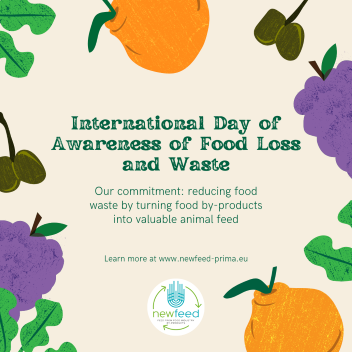
Tackling Food Loss and Waste: Newfeed’s Contribution to a Sustainable Future
Each year, on September 29th, the world comes together to recognize the International Day of Awareness of Food Loss and Waste. This day is a global call to action, urging everyone to address one of the most pressing challenges of our time: reducing Food Loss and Waste. As we work toward a more sustainable future, the Newfeed project is proud to contribute to this mission by converting food industry by-products into valuable feed for livestock.
The Global Challenge of Food Loss and Waste
According to the UN, approximately one-third of the food produced globally is wasted each year. This represents not only a significant waste of resources, including water, energy, and labor, but also an environmental threat, as discarded food contributes to greenhouse gas emissions. Food loss and waste occur at various stages—during production, processing, and distribution—but they also provide an opportunity. By reusing and repurposing these resources, we can move toward a more circular, sustainable economy.
Newfeed’s Role in Reducing Food Waste
The Newfeed project takes an innovative approach to reducing food waste while simultaneously ensuring the sustainability of livestock production. Active in three Mediterranean countries—Spain, Greece, and Egypt—Newfeed focuses on utilizing by-products from winery, orange juice, and olive oil industries, to create alternative feed resources for livestock.
By turning food industry by-products into secondary feedstuffs, Newfeed addresses multiple issues at once:
- Minimizing Waste: Instead of discarding these by-products, Newfeed gives them a second life in the food chain, reducing the environmental burden of waste.
- Sustainable Livestock Production: By using Mediterranean sourced feed, Newfeed helps reduce the environmental impact and cost of livestock farming. This not only makes the system more sustainable but also reduces reliance on imported feed.
- Promoting Circular Economy: Newfeed’s approach is rooted in circular economy principles, where resources are reused and repurposed to extend their lifecycle. In this way, the project creates consolidated value chains that benefit farmers, livestock, and the environment.
Newfeed’s strategy provides a forward-thinking solution by converting local by-products into animal feed, improving animal productivity and product quality while reducing external dependencies on imported feed materials.
Conclusion: Together, We Can Make a Difference
On this International Day of Awareness of Food Loss and Waste, Newfeed reaffirms its commitment to reducing food waste through sustainable practices. By converting food by-products into valuable animal feed, we not only minimize waste but also contribute to a healthier environment and a more resilient food system. Every step we take—no matter how small—brings us closer to our goal.
Join us in spreading awareness and supporting initiatives like Newfeed, which are crucial to building a sustainable and waste-free future.


